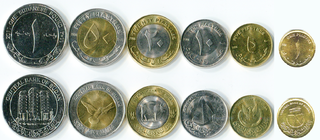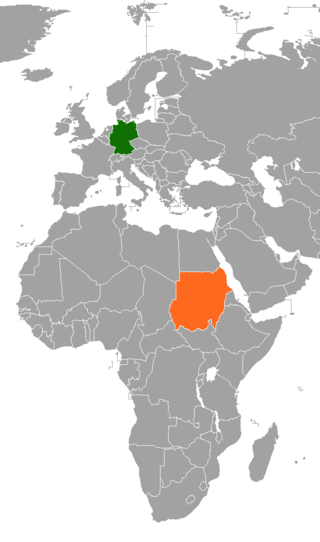
Sudan, officially the Republic of the Sudan, is a country in Northeast Africa. It borders the Central African Republic to the southwest, Chad to the west, Egypt to the north, Eritrea to the northeast, Ethiopia to the southeast, Libya to the northwest, South Sudan to the south, and the Red Sea. It has a population of 45.7 million people as of 2022 and occupies 1,886,068 square kilometres, making it Africa's third-largest country by area and the third-largest by area in the Arab League. It was the largest country by area in Africa and the Arab League until the secession of South Sudan in 2011; since then both titles have been held by Algeria. Its capital city is Khartoum, and its most populous city is Omdurman.

The current flag of Sudan was adopted on 20 May 1970 and consists of a horizontal red-white-black tricolour with a green triangle at the hoist. The flag is based on the Arab Liberation Flag of the Egyptian Revolution of 1952, as are the flags of Egypt, Iraq, Syria, Yemen, and Palestine and formerly of the United Arab Republic, North Yemen, South Yemen, and the Libyan Arab Republic.

Anglo-Egyptian Sudan was a condominium of the United Kingdom and Egypt between 1899 and 1956, corresponding mostly to the territory of present-day South Sudan and Sudan. Legally, sovereignty and administration were shared between both Egypt and the United Kingdom, but in practice the structure of the condominium ensured effective British control over Sudan, with Egypt having limited local power and influence. In the meantime, Egypt itself fell under increasing British influence. Following the Egyptian Revolution of 1952, Egypt pushed for an end to the condominium, and the independence of Sudan. By agreement between Egypt and the United Kingdom in 1953, Sudan was granted independence as the Republic of the Sudan on 1 January 1956. In 2011, the south of Sudan itself became independent as the Republic of South Sudan.

The Sudan national football team represents Sudan in international football and is controlled by the Sudan Football Association, the governing body for football in Sudan. Its home ground is Khartoum Stadium in the capital Khartoum. In 1957, it was one of the three teams to participate in the inaugural Africa Cup of Nations, the other two being Egypt and Ethiopia.

Islam is the most common religion in Sudan and Muslims have dominated national government institutions since independence in 1956. According to UNDP Sudan, the Muslim population is 97%, including numerous Arab and non-Arab groups. The remaining 3% ascribe to either Christianity or traditional animist religions. Muslims predominate in all but Nuba Mountains region. The vast majority of Muslims in Sudan adhere to Sunni Islam of Maliki school of jurisprudence, deeply influenced with Sufism. There are also some Shia communities in Khartoum, the capital. The most significant divisions occur along the lines of the Sufi brotherhoods. Two popular brotherhoods, the Ansar and the Khatmia, are associated with the opposition Umma and Democratic Unionist Parties respectively. Only the Darfur region is traditionally lacking the presence of Sufi brotherhoods found in the rest of the country.
"Naḥnu Jund Allāh Jund al-Waṭan" is the national anthem of Sudan. The words were written by the poet Ahmed Mohammed Saleh and the tune was composed by Ahmed Morjan in 1955. It is officially called the Republican Salute, as it is called for short, the Flag Anthem or Flag Salute.

The Sudanese pound is the currency of the Republic of the Sudan. The pound is divided into 100 piastres. It is issued by the Central Bank of Sudan.

The current national emblem of Sudan was adopted in 1985.

Sudan first participated at the Olympic Games in 1960, and has sent athletes to compete in most Summer Olympic Games since then. The nation did not attend the 1964 Games, boycotted the 1976 Summer Olympics along with most African nations, and participated in the American-led boycott of the 1980 Summer Olympics. The nation has never participated in the Winter Olympic Games.

The flag of South Sudan was adopted following the signing of the Comprehensive Peace Agreement that ended the Second Sudanese Civil War. A similar version of the flag was previously used as the flag of the Sudan People's Liberation Movement. The flag of South Sudan predates the country, as the flag was adopted in 2005, while the country became independent in 2011.

South Sudan, officially the Republic of South Sudan, is a landlocked country in eastern Central Africa. It is bordered by Ethiopia, Sudan, the Central African Republic, the Democratic Republic of the Congo, Uganda, and Kenya. Its population was estimated at 11,088,796 in 2023. Juba is the capital and largest city.

South Sudan is a Christian majority country, with Islam being a minority faith practiced by around 6.2% of the total population as of 2020. Most Muslims in South Sudan welcomed secession in the South Sudanese independence referendum.

The 1969 Sudanese coup d'état was a successful coup, led by Colonel Gaafar Nimeiry, against the government of President Ismail al-Azhari. The coup signaled the end of Sudan's second democratic era, and saw the beginning of Nimeiry's 16 year rule.

South Sudanese nationality law is regulated by the Constitution of South Sudan, as amended; the South Sudanese Nationality Act and Nationality Regulations, and their revisions; and various international agreements to which the country is a signatory. These laws determine who is, or is eligible to be, a national of South Sudan. The legal means to acquire nationality, formal legal membership in a nation, differ from the domestic relationship of rights and obligations between a national and the nation, known as citizenship. Nationality describes the relationship of an individual to the state under international law, whereas citizenship is the domestic relationship of an individual within the nation. In South Sudan, nationality is often equated with ethnicity, despite recognition of the legal definitions. South Sudanese nationality is typically obtained under the principle of jus soli, i.e. by birth in South Sudan, or jus sanguinis, born to parents with South Sudanese ancestry. It can be granted to persons with an affiliation to the country, or to a permanent resident who has lived in the country for a given period of time through naturalization.

Germany–Sudan relations are the current and historical relations between Germany and Sudan. The Federal Republic of Germany was the first country to recognize Sudan diplomatically in 1956. Due to its mediating position in the various armed conflicts in the country, Germany is a trusted partner for Sudan.